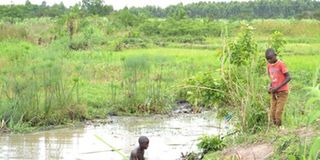Commit more resources to wetland perseveration

Children play at a section of the Lubenge wetland in Nakasongola District. Locals accuse government of playing double standards and allocating wetlands to private investors. PHOTO | FILE
What you need to know:
The issue: Weetland perseveration.
Our view: It is our appeal that government walks the talk if we are to stop wetland degradation and restore what we have lost. We already have policies and law in place to do this.
This week, Uganda joined the rest of the world to mark the World Wetlands Day that is celebrated every February 2.
This day is particularly important to Uganda because the country has been rapidly losing its wetland coverage. According to the 2019 wetland status report by the Ministry of Water and Environment, our wetland coverage significantly declined from 13 percent in 1994 to 8.9 percent in 2019.
And this has had significant effects on the economic and social lives at both household and national level. Wetlands are estimated to contribute more than Shs3.5 trillion per year to Uganda’s GDP and more than 80 percent of the population use wetland resources directly for their household food security needs.
Wetlands also play a significant role in absorbing carbon; moderating climate; flood control; purifying water and maintaining water tables, among others.
Aware of the pressure on wetlands by the increasing population for purposes of getting land to farm, set up homes and industries, government has previously ordered all encroachers to leave and former wetlands restored.
A law, the National Environment Management Act of 2019, which establishes a specialised enforcement taskforce, was also passed. However, not much tangible results have been achieved. Despite a few arrests of encroachers and some evictions, encroachment on wetlands continues on a large scale.
For example, appeals to authorities to stop the destruction of the Lwera wetland on Kampala–Masaka highway in Kalungu District over the years seem to go unheard. We also still have some unscrupulous people issuing land titles on wetlands. In short, the elite and powerful do whatever they want because the law does not touch them.
The impact of degradation of wetlands is already being felt. A report by the Natural Resources Committee of Parliament in 2016 revealed that human activities had affected the fish stock within Lake Victoria since Lwera wetland acted as a breeding area.
This week alone, government committed to relocate more than 5,000 people who were recently affected by floods in Obongi District. Much of the flooding around the country has been attributed to degradation of wetlands.
It is, therefore, our appeal that government walks the talk if we are to stop wetland degradation and restore what we have lost. We already have policies and law in place to do this. What is lacking is the operationalisation of these laws.
Government needs to commit deliberate investments towards wetland preservation and restoration, otherwise the warning that we could lose all wetlands in in the next 20 years seems very likely.
Our commitment to you
We pledge:
- To be accurate and fair in all we do.
- To be respectful to all in our pursuit of the truth.
- To refuse to accept any compensation beyond that provided by Monitor Publications Ltd. for what we do in our news gathering and decision-making.
Further, we ask that we be informed whenever you feel that we have fallen short in our attempt to keep these commitments.




